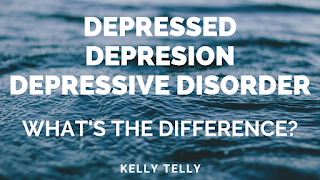Truthfully, I am really grateful that in this time & age, mental health awareness is increasing as ever.
But, people has been fighting on what cures mental illness, and what not. For example, people have been falling between two extremes on whether being religious have any positive impact on any mental disorder. Some strongly agree and some strongly does not see the correlation.
I’m not here to talk about that. I told my story already here.
But I believe this happens because people actually got mixed up on what is mental illness, what is mental condition, and what is not.
So let’s get this straight once & for all!
1. (Depressed) Mood/feeling
(I put depressed in bracket, because it can be replaced with any emotions; anxious, even happy. But we’ll take depressed as an example to show all along the post, so we can visualize it easier)
It’s a mood, a feeling, that lasts relatively in a small amount of time, from minutes to hours. Probably the longest you’ll feel is a day. Usually due to some events, or maybe you just wake up with a (example: good) mood today. And it can be changed too quite easily.
Example: your teacher scolds you in class today. So you’ll be in a bad or depressed mood for quote a couple of hours. But suddenly your friend treated you an ice-cream. That bad mood would disappear.
2. (Depression/Depressed) Condition
It’s a condition that you’re in, that emerge from certain significant event, that lasts for a certain period amount of time.
It cannot easily be changed like mood/feeling, but eventually you will recover. And doing things like, talking to people, prayer, exercise, etc, will help your recovery.
Example: Your mother died, so you are in depressed condition. Even when you friend brought you ice-cream, it won’t go away. But it would help you feel better; doing what you like (eating ice-cream) & having a friend beside you. You might try other things that would help like prayers, talking to people, etc. In 2-3 months then finally you’re able to move on from your depressed condition.
3. (Depressive) Disorder
It is clinical, and should be treated like any other serious disease; go to doctor & get treatment.
Why? Because like other disease, risk factors are the ‘decider’ if would you get it. A traumatic event could be one, but that’s not the limit (genetics, childhood experience, accumulated trauma, beliefs, parenting style, brain damage history, etc).
The things that I’ve mentioned would help you before, would not have a direct effect this time. But it acts as things that ground you. It’s the one thing that you can control on doing.
Because the symptoms can come any time, at any intensity, regardless where you are or how feel. You can’t control it. It just comes & goes.
Finally, it must fulfill the requirements of being classified as an abnormal disorder, according to the Diagnosis and Statistical Manual of Mental Disorders. While it is true that every diagnosis is different, there is four similarities across all disorders, that you must experience in order to say that you do have a mental disorder:
- It is statistically infrequent
- It makes you unable to function as a normal person
- It causes you distress
- It makes you violates the norm (eg- harming your own self, or doing things repeatedly)
Example: Your mother dies. You expect to go through this sadness in 4 months. But after 4 months, that overwhelming sadness is still there (risk factor – a traumatic event).
Even you yourself don’t want to be sad. But you just can’t help it; you’re sad (not in control of symptoms). So sad to the point you cannot get out from bed & do your work (dysfunctional).
And you know you shouldn’t be that way, and you need to change it, but you can’t. That frustrates you. And makes you even sadder (causing distress).
And you want to end it to the point of actually ending yourself. No you, no pain (Violating norms – suicidal ideation).
But you know that’s not the answer. You understand that you are now beyond being in depressed condition. You don’t blame God for this. You don’t think you’re a bad guy, or inadequate. You just got sick, and you need to go through treatment to heal. So you went to the doctor & he prescribed treatments.
As you do your treatments, you also try your best to do those other little helping things that obviously won’t magically cure you, like exercising, talking to people, praying & others. By doing these things, it can help reduce a bit the symptoms to keep yourself as functioning as possible.
So, do you get it now? On what is a mental disorder, and what is not?
Thus, many people have disagreements whether those little helping things ‘cure’ mental illness or not.
Well, the answer is, they don’t cure. But they help. In a significant way.
And, those little helping things do ‘cure’ (if you want to call it cure) the other two, with the second one being more indirect.
If we’re feeling depressed, by doing those, it would go away (varying duration and ways within individuals).
If we’re in depressed condition, by doing those, it would help shorten our recovery duration.
If we’re having depressive disorder, by doing those, it would help reduce your symptoms to keep yourself functioning, to some people at the minimum level.
I hope this distinction clear things out. This is the least that I can do, as someone who is learning psychology. Hopefully it’ll benefit those in need.

